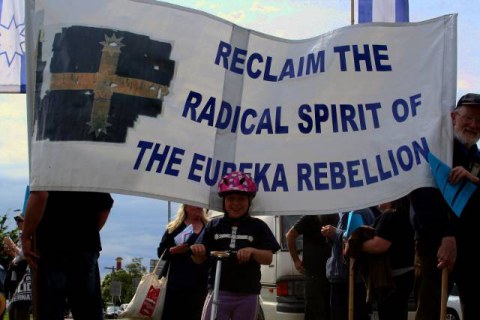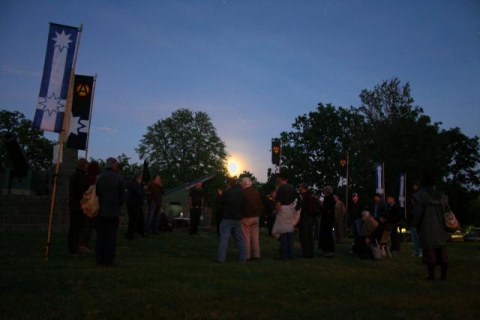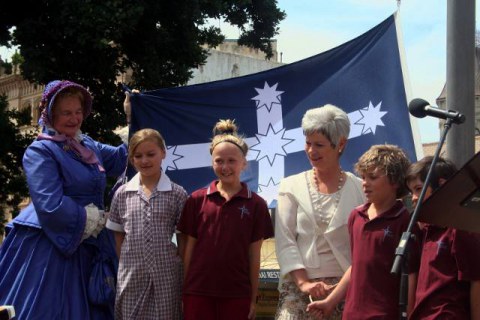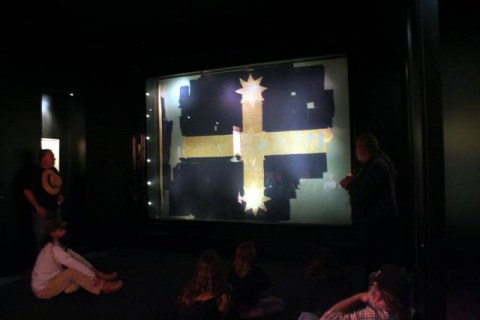Some 25 people stood around a monument in Ballarat in the pre-dawn hours of December 3 aknowledging the Eureka Diggers who fought and died to defend our rights and liberties one hundred and fifty five years ago.
The Dawn Commemoration this year was broadcast live from 4am to 6am on Melbourne Community Radio Station 3CR. Dr Joe Toscano gave an informative introduction on the Eureka rebellion and its importance for us today, before passing the microphone around the circle for everyone to articulate the personal meaning of Eureka for us today facing new onslaughts on our rights and liberties.
Related: Spirit of Eureka: Pat Mackie
In 2004, the 150th anniversary, there was a major commemoration of the events of Eureka. But for the most part the anniversary date of December 3 has not had any official events. Usually events are scheduled on the closest weekend. Since 2002 The Anarchist Media Institute has been holding Dawn commemmorations on December 3 as part of a full day of activities in discussing the meaning and spirit of the Eureka Stockade Rebellion and its relationship to current social justice issues and campaigns.
There have been calls for Ballarat City Council to fly the Eureka Flag from the topmost flagpole on the Town Hall on December 3. This has still to happen. But it was significant this year that Ballarat City Council had scheduled a Eureka Flag raising event at 11am opposite the Town Hall near the statue of Queen Victoria. This marks an important shift by Council. The major, Judy Verlin, officiated in raising the Eureka Southern Cross with a class of Grade 5 students from St Alipius Catholic Primary School in attendance.
It was a little bit of theatre for the local media complete with two actors from Sovereign Hill who performed orations by Rafaello Carboni and Peter Lalor. The actor who played Peter Lalor, the diggers elected Leader, wizzed through swearing the Eureka Oath under the Eureka Flag. This could have been performed more theatrically by encouraging the crowd to swear the oath with him.
Earlier in the morning activists had marched from Eureka Park to Bakery Hill, the site of the monster meetings of diggers in 1854. Here, in front of a flagpole flying the Southern Cross in the middle of a busy traffic roundabout the Eureka Day Medals are awarded. The site was saved from development to build a McDonalds restaurant in the 1970s by the Builders Labourers Federation - McDonalds built next door instead.
The Eureka Day Medals are awarded by the Anarchist Media Institute to nominated people who best demonstrate the spirit of the Eureka Oath. The 2009 award winners were John Englart (Speech), Jessica Harrison, Ellen Jose, Bill Pickering, and Jack Grancharoff (in absentia).
At the conclusion of the awards the Eureka Oath was sworn by the youngest present, 9 year old Taz, with everyone joining in:
"We swear by the Southern Cross to stand truly by each other and fight to defend our rights and liberties"
Following the Flag rasing ceremony activists marched up to the old Ballarat Cemetery where both the Diggers and Soldiers monuments were visited. Flowers were laid at the foot of diggers monument. Next stop was the Ballarat Fine Art Gallery, where people relaxed in some air-conditioned comfort while hearing Joe Toscano explaining he history and ongoing debate around the original Eureka Flag and where it should be housed.
Keeping alive the spirit and ideas of Eureka continues. People attended from as far afield as Adelaide, Brisbane and Darwin this year, with the option of many more listening to the dawn commemoration live on radio 3CR.
The previous Friday a commemoration was also held in Melbourne on Friday 27 November, on the steps of the State library. A mock up contemporary Eureka Stockade was constructed on the steps of the State Library with banners, placards and flags inside the Stockade.
In keeping with the spirit of Eureka the rally demands included abolishing the ABCC, working people's rights to health and safety, renewable energy, human rights for refugees, and democratic rights of communities. Speakers included Fr. Bob Maguire, Dave Noonan, civil liberties barrister Rob Stary, Margaret Williamson (Eureka descendent), Pamela Curr (Asylum Seekers Resource Centre), David Spratt (Environment Action Centre) (Youtube video), Gerry Conlon (Guildford 4) and Paddy Hill (Birmingham 6).
Gerry Conlon and Paddy Hill warned of the dangers of increased police power. They were innocent Irishmen jailed by corrupt British police for 15 and 16 years for crimes they did not commit. Mr Conlon, whose autobiography was adapted into the film In The Name Of The Father, served 15 years in prison after being found guilty of an IRA bombing in Guildford, despite having never been a member of the IRA – let alone involved in any bombings. His father, Giuseppe Conlon, died in prison on the same charges.





Comments
Re: Spirit of Eureka: Pat Mackie
In the radical spirit of the Eureka rebellion; Pat Mackie !
http://www.iww.org.au/node/1182
Pat Mackie, 1914-2009.
When in 1964 the Queensland government of Sir Francis Nicklin decided to call on all its powers to crush a strike by Mt Isa's miners, one man stood in their way - the union radical Pat Mackie. He led the strike, inspiring the miners to keep going, in a period when police were given carte blanche to suppress them. The townspeople, in response, painted the town with swastikas by night. The 32-week strike, which extended into 1965, resulted in a victory for the miners but Mackie was targeted by an enraged federal government, which investigated ways to deport him.
Mackie, whose father was Australian, was born in New Zealand on October 30, 1914, and according to the nationality laws in Australia at the time, he was an Australian citizen. His family name, according to the scant information available on his personal life, was Murphy. Mackie went to sea as a teenager because he wanted to see America. In his own account of his life, he said he was a stowaway and that he complained to the captain about the unsatisfactory state of his accommodation. For 15 years, as a seaman, he travelled the world.
Mackie was attracted to the left-wing Industrial Workers of the World (the Wobblies). He worked with communists and nearly joined a branch of the Communist Party in Canada. Labour historian Dr Greg Mallory said Mackie did not become a communist but vigorously opposed forces that tried to drive communists from the union movement. At some stage in his life in Canada, Mallory says, Mackie was married, but there are no records of his ever having any children.
Mackie got object lessons in how the workers could control workplace situations. He became engaged in union activities and was a ''captain of picket captains'' in a lengthy New York waterfront strike in 1948, in which police used horses specially trained to rear up and kick at picketers and gangsters, acting on behalf of the agents provocateur who were infiltrating union lines. Mackie learnt a lot about union tactics in North America and the sort of mischief that could be visited on erring employers.
At some point, perhaps to distance himself from his past troubles, misspellings on his names on payslips and other confusions, Mackie adopted the name Eugene Markey. That was later changed to Maurice Patrick Markey, Pat Markey and finally Pat Mackie. Mackie got into trouble with the law and served several prison sentences overseas. That included time in several Montreal prisons on charges indirectly related to union activities. In one incident, he was to claim in his 2002 autobiography, Many Ships to Mt Isa, police loaded him with drugs. Mackie was deported to New Zealand and in 1949 he ended up in Sydney.
Mackie heard there was money to be made mining in Mt Isa. He went north and worked for a few weeks in Brisbane until another brush with the law sent him north to Bundaberg, where again he clashed with the police, for having the cheek - in police eyes - to complain about their treatment of an Aboriginal man. Mackie arrived in Mt Isa in 1950, worked for Mt Isa Mines but was quickly branded a troublemaker. He decided to move out of town to mine independently and did so for 10 years, with the aim of buying a small ketch and travelling the world.
Instead, in 1961, he started again at Mt Isa Mines, operated by one of the world's largest mining companies, the American Mining and Smelting Corporation. Mackie was initially a contract ''truckie'', then a contract mine timber worker. The strike which began in August 1964, was initially over the issue of adequate showers for men at the end of shift. It escalated into a demand for a £4 a week wage rise and better conditions. The company opposed the claims and had vigorous support from the federal and Queensland governments. Wearing a distinctive red cap, Mackie found himself leading 4000 mine workers from more than 40 countries.
Publicity over the strike turned him into a household name throughout Australia. During the strike he met Elizabeth Vassilieff and struck up a long-term relationship. Vassilieff was to write of him that he ''sees his own needs very simply, voices them fearlessly and became a phenomenally effective workers' spokesman and trade union organiser, a power to be reckoned with in the industrial world. His strength lies in his formidable combination of his magnetic personality with high abilities in three functions of leadership: in clearly analysing the workers' situations; in democratising their organisation; and in brilliant powers of oratory, enabling him to unite the rank and file and fire them with unshakable loyalty.''
The Australian Council of Trade Unions threatened a statewide 24-hour strike in Queensland, which caused the Nicklin government to call off its state of emergency. The strike ended when the Industrial Relations Commission granted most of what the unionists were striking for.
Mackie said it was ''a living lesson in the constructive potential of rank-and-file working people … a triumph of the human spirit''. But the Nicklin government had a totally different view. Mackie was referred to as ''a vicious gangster''. Sir Francis said the strike was part of a ''communist strategy'' to wreck every major development in the state. The federal government liaised with ASIO on whether it was possible to deport Mackie and received advice it was not.
Loyalty to Mackie was not universal in the trade union movement. He was expelled from the right-wing Australian Workers Union.
In 2002, Mackie published his autobiography. A reviewer wrote: ''When confronted as to his ideological position, he would clearly define himself as a Wobbly, working tirelessly to improve the working and living conditions of the rank and file''. Mackie's achievements were later celebrated in 2007 in a Queensland musical, Red Cap, and his legacy to Mt Isa was good working conditions and other community facilities.
Malcolm Brown
Source:
http://www.smh.com.au/national/obituaries/rank-and-file-hero-who-led-mt-...
Re: Activists commemorate the spirit of Eureka Stockade
I met Pat Mackie in the 1970s. He was one of those down to earth people really easy to approach and talk to, and prepared to share what he had learnt about union organising with fellow activists. He stood truly by his fellow workers to improve conditions and rights and liberties.
Vale fellow worker.
Pat Mackie and the Mount Isa Dispute 1964/5
http://www.takver.com/history/mountisa1964.htm